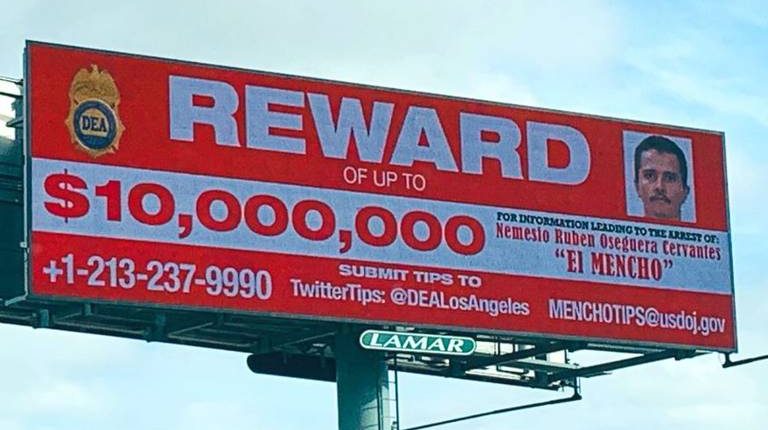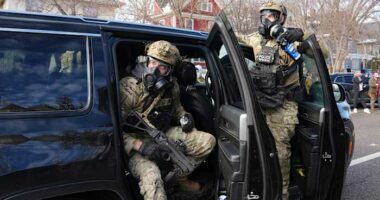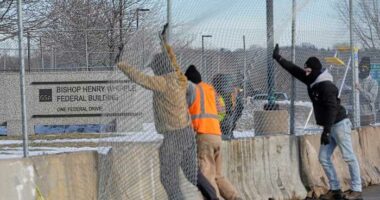Share this @internewscast.com
EL PASO, Texas (Border Report) – It was barely a few weeks ago that Drug Enforcement Administration agents raided a warehouse in Los Angeles where they knew they’d find drugs.
What they did not expect to find was a mural stretching from floor to ceiling of a man whose face they were familiar with, wearing a bulletproof vest and the insignia of the Jalisco New Generation Cartel, or CJNG.
It was the face of Nemesio Oseguera Cervantes – “El Mencho” – the ruthless supreme leader of Mexico’s Jalisco cartel and one of the principal exporters of illegal fentanyl to the United States.
“A shrine,” said Matthew Allen, special agent in charge of the DEA’s Los Angeles Field Division. “Not hidden in the jungle or some remote compound, but right in the heart of America’s second largest city. The message was clear: We are here, we are among you.”


The Mexican drug cartels’ infiltration in major U.S. cities and American society was a narrative the DEA official brought to a hearing of the Senate Judiciary Committee on Tuesday.
Members heard sworn testimony of how nefarious characters have fled Mexico after committing atrocities and seemingly had no trouble hiding in plain sight in American communities.
One of them was Cristian Gutierrez Ochoa, a son-in-law of El Mencho.
Gutierrez in November 2021 learned his mentor El Mencho’s wife had been arrested in Mexico and took Mexican marines as hostages to secure her release. According to the U.S. Justice Department, the scheme failed and put Gutierrez in the crosshairs of Mexico’s military.
Gutierrez faked his own death and snuck into the United States. The DEA caught up with him last November in Riverside, California.
“It quickly came to our attention he was living in a gated community just down the street from the chief of police,” Allen said. “He was living a life of luxury – with luxury watches, things of that nature, living his life here in the United States.”
He was even sending his children to local schools, the DEA official said.
Ruben Oseguera Gonzalez, the son of El Mencho and a top CJNG leader, was unable to savor a life of comfort in the U.S. after being extradited from Mexico in 2020. But the Jalisco cartel made every effort to free him.
“During the trial of ‘El Menchito’ (Little Mencho), cartel operatives were caught surveilling DEA agents and informants right here in Washington, D.C.,” Allen told the Senate committee.
Not being able to spring him in the U.S., the cartel retaliated in Mexico, killing the daughter of an informant in the case and murdering a Mexican soldier.
El Menchito got life in prison plus 30 years for his role in growing the Jalisco cartel into a $6 billion illicit enterprise.
Allen, who spent time on assignment in Mexico, testified of several instances of cartel members directly “shadowing” DEA agents both in Mexico and in the United States. North of the border, the surveillance typically happens prior to arrests being made and DEA agents often have to call for local police departments to assist them with a show of force.
“This is who were are up against: Paramilitary cartels with global reach willing to kill families and surveilling U.S. personnel in our own soil,” Allen said. “We’re not dealing with street dealers or smuggling mules. What we face in Southern California is a full-scale infiltration by foreign criminal empires: The Sinaloa cartel and the Jalisco New Generation Cartel.”











